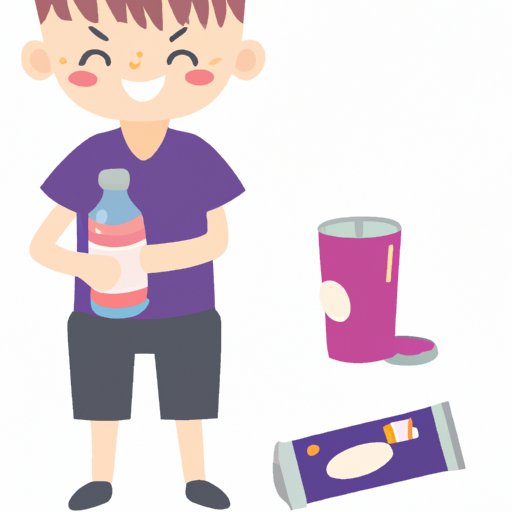
I. Introduction
Going through tooth extraction is never a pleasant experience, but with proper care, it can be a smooth and successful recovery. One of the things you need to be mindful of is your beverage choices during the healing process. Carbonated drinks are a tricky one, as they are highly popular but can have negative impacts on the recovery. In this article, we will explore when it is safe to consume carbonated drinks after tooth extraction, the risks associated, alternative beverages and foods to promote optimal healing, and debunk common myths and misconceptions.
II. The Dental Extraction Process
The dental extraction process involves removing a tooth from the socket in the jawbone under local anesthesia. The extraction area forms a blood clot that protects the bone and nerves underneath, allowing for the healing process to occur. Carbonated drinks can interfere with this process, as the carbonation causes bubbles that could dislodge the clot and lead to a dry socket. Dry socket is a painful condition that occurs when the blood clot is dislodged, exposing the bone and causing inflammation.
To avoid any negative impacts, you should avoid drinking carbonated drinks for the first 24 to 48 hours after the extraction. You should also avoid using a straw or smoking as the sucking motion can dislodge the clot as well. Instead, opt for water, milk, or other beverages that do not contain any carbonation.
III. Recovery After Tooth Extraction
The healing process after tooth extraction typically takes around one to two weeks. During this time, it is best to avoid drinking carbonated drinks as they can hinder healing and prolong recovery time. Instead, you can drink healthy, alternative beverages such as natural fruit juices, smoothies, and herbal tea. It is essential to consume food that is soft, easy to chew, and nutrient-dense, such as mashed potatoes, soups, and cooked vegetables. High protein and vitamin C diets will support the healing process. It will help replenish the lost nutrients and boost the immune system.
IV. Risks Associated with Consuming Carbonated Drinks
Although drinking carbonated drinks might not cause any immediate harm, there is a risk of several uncomfortable side effects. Firstly, the carbonation may cause pain and sensitivity in the extraction site, leading to discomfort. Secondly, the high amount of sugar in carbonated drinks promotes the growth of harmful bacteria, which could lead to infections in the extraction site. Lastly, it could cause dry socket, which is an excruciating condition that needs immediate treatment.
If you experience any discomfort or severe pain after drinking carbonated beverages, contact your dentist immediately. They will examine your extraction site to check if there are any infections or dry sockets. Antibiotics and pain medication will be prescribed accordingly.
V. Re-introducing Carbonated Beverages
After two weeks, you can gradually reintroduce carbonated drinks into your diet. Start with small sips and observe how your body reacts, if you do not experience any discomfort, increase your intake. Continue to drink plenty of water and other healthier alternatives to maintain good dental hygiene. It is also best to brush and floss your teeth regularly to avoid any food or drink debris stuck in the extraction site.
VI. Myths and Misconceptions
There are several myths and misconceptions related to drinking carbonated drinks after tooth extraction. One of them is that ice-cold carbonated drinks can help soothe the pain and swelling. In reality, drinking cold drinks after tooth extraction can cause more pain and sensitivity. The other common myth is that drinking carbonated mineral water is safe because of its mineral content. However, the carbonation in mineral water is still significant and can lead to the negative side effects mentioned earlier.
To care for your teeth after the procedure, avoid drinking anything that is too hot or cold for the first three days. Chew on the side opposite the extraction site, and avoid brushing the site for a few days. Rinsing with saltwater and using a soft-bristled toothbrush can also help to maintain dental hygiene.
VII. Conclusion
To ensure a smooth and successful recovery after tooth extraction, it is essential to be mindful of your beverage choices. Carbonated drinks should be avoided during the healing process as they could hinder the blood clot’s formation and lead to painful conditions such as dry socket. Instead, drink alternative healthy beverages such as natural fruit juices and herbal tea, and consume nutrient-dense foods that promote optimal healing. Avoiding common misconceptions and adhering to proper oral hygiene practices will help ensure the healing process is speedy and successful.
Final thoughts and recommendations: Remember that proper oral hygiene is essential, especially after tooth extraction. Brush your teeth regularly, rinse with saltwater, and avoid consuming any overly hot, spicy, or cold food or drinks. Avoid smoking and drinking alcohol during the recovery period. Consult with your dentist if you experience any side effects or have any concerns about your recovery.




